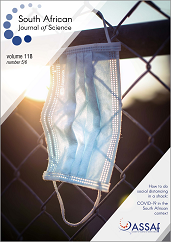The inhibitors and enablers of emerging adult COVID-19 mitigation compliance in a township context
DOI:
https://doi.org/10.17159/sajs.2022/13173Keywords:
Coronavirus Disease 2019 (COVID-19), co-regulation, multisystemic resilience, preventative behavioural response, self-regulationAbstract
Young adults are often scapegoated for not complying with COVID-19 mitigation strategies. While studies have investigated what predicts this population’s compliance and non-compliance, they have largely excluded the insights of African young people living in South African townships. Given this, it is unclear what places young adult South African township dwellers at risk for not complying with physical distancing, face masking and handwashing, or what enables resilience to those risks. To remedy this uncertainty, the current article reports a secondary analysis of transcripts (n=119) that document telephonic interviews in June and October 2020 with 24 emerging adults (average age: 20 years) who participated in the Resilient Youth in Stressed Environments (RYSE) study. The secondary analysis, which was inductively thematic, pointed to compliance being threatened by forgetfulness; preventive measures conflicting with personal/collective style; and structural constraints. Resilience to these compliance risks lay in young people’s capacity to regulate their behaviour and in the immediate social ecology’s capacity to co-regulate young people’s health behaviours. These findings discourage health interventions that are focused on the individual. More optimal public health initiatives will be responsive to the risks and resilience-enablers associated with young people and the social, institutional, and physical ecologies to which young people are connected.
Significance:
- Emerging adult compliance with COVID-19 mitigation strategies is threatened by risks across multiple systems (i.e. young people themselves; the social ecology; the physical ecology).
- Emerging adult resilience to compliance challenges is co-facilitated by young people and their social ecologies.
- Responding adaptively to COVID-19 contagion threats will require multisystem mobilisation that is collaborative and transformative in its redress of risk and co-championship of resilience-enablers.
Open data set: https://doi.org/10.25392/leicester.data.17129858
Published
Issue
Section
License

All articles are published under a Creative Commons Attribution 4.0 International Licence
Copyright is retained by the authors. Readers are welcome to reproduce, share and adapt the content without permission provided the source is attributed.
Disclaimer: The publisher and editors accept no responsibility for statements made by the authors
How to Cite
- Abstract 547
- PDF 821
- EPUB 540
- XML 521
Funding data
-
Canadian Institutes of Health Research
Grant numbers IP2- 150708 -
Global Challenges Research Fund
Grant numbers Research England: S15HP10












.png)